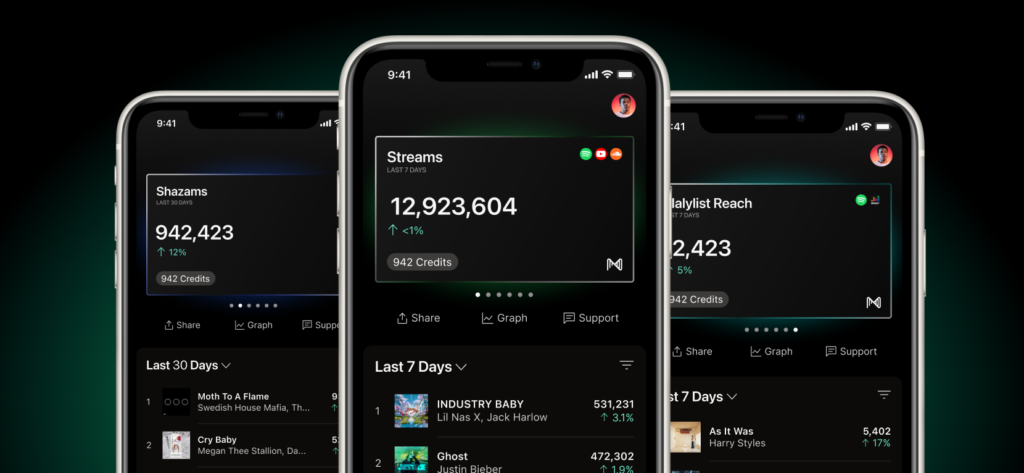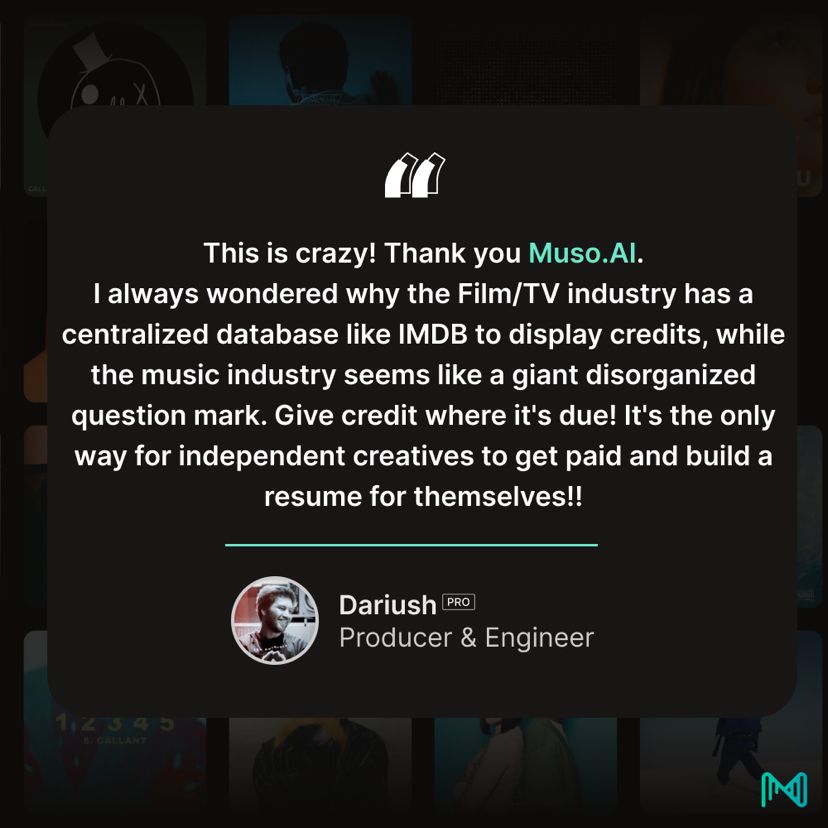Who are you? Where do you work?
I’m Kyran de Keijzer, co-founder and chief product officer at Muso.AI. I’m based in Amsterdam. Our team is international and fully remote, working in the US and Ukraine as well.
What are you currently listening to?
I’m in one of those nostalgia phases where I add everything I used to listen to into my library. I’m back to ‘70s and ‘80s rock at the moment. I grew up on that stuff. Nic D is the latest, newest pop artist I’m listening to. I found him on TikTok. I’m also back into blackbear a lot. Everything he’s doing.
Give us a small insight into your daily routine…
I honestly spend a lot of time in meetings. That can mean guiding strategic development, product design, new tech, or guiding company growth including interviewing and hiring. Our team is spread out and not everyone has a background in the music industry, so I often act as a hub and a resource to team leaders or individuals, finding out what barriers exist and helping get unstuck.
In that regard, usually, people just need a little extra context. We grew rapidly over the last six months—from about 12 people to close to 50—and there are a lot of nuances to how we manage industry data, how we show it to users, and how we can translate it into a valuable tool for creators.
The data set is so large. We have an immensely talented team, but not everyone has that understanding that comes from working in the studio for a long time. I can help provide a level of user and industry insight so that company-wide we’re all on the same page with our mission and purpose.
On the future of credit data and getting creators to engage…
So, I used to be a DJ, like one of those focused crate diggers. In high school, I’d show up every week with 100 to 200 new tracks no one had ever heard before. Oh, you want more rock? Okay, cool. I’ll load your MP3 stick for you. Hip hop? I’ll put that on yours next week.
Today, I find that I really struggle with discovery. Now, you don’t even search for music. You get fed something that the algorithm thinks you like, and it’s been shown that the algorithm can be very heavily influenced if you have a lot of money. It’s almost like those skinny mirrors you see in stores. Your searches aren’t properly reflecting everything that you’re curious about. They’re being influenced to ensure that you hear or see what others want you to hear and see.
For me, that makes discovery hard. But that’s a space where Muso.AI can eventually help bring some transparency. There’s a lot of opportunity for the metadata we have to drive a new kind of music discovery. Imagine being able to sign up for a daily notification listing all the hip-hop tracks released in the last 7 days that involved a specific songwriter or saw overnight growth in streaming. That’s just one example, but the options are endless. We could escape the algorithms. You can get back to searching within your specific wheelhouse or intention, but you’ll be using data rather than searching through stacks.
A scenario like that relies heavily on accurate metadata. Right now, with the way the industry data is reflected, it would be impossible. The information is not at all accurate or standardized. That’s another point of frustration we run into—the quality of the industry’s data—but that’s ultimately why we’re here.
Fundamentally, we want to get that industry metadata in front of creatives—to hold up a mirror to what is being credited on their work and to find out if it’s true. We’re not the arbiter or source of truth. The creators are. The people that were in the room recording are. There’s a misconception that we’re going to have the right data when users download the app, but it’s quite likely that we don’t. The fact is, the 50,000 most popular tracks right now don’t have 100% full songwriter and producer credits. It’s much closer to 60-70%.
The only way to fix that is to get the creators—that includes musicians, songwriters, producers, mixers, engineers, and everyone involved in that recording—to take a look at their credits and see if they’re accurate.
That’s our whole mission—we want to educate people on the surprising quality of the credit data out there so that they can change it, update it, and make it right in a way that sticks.
So far, with Muso.AI, we’ve found that the greatest motivator for people to claim and confirm or edit their credits is getting access to cross-platform analytics. We put a lot of energy into Muso.AI’s analytics features for that reason. That’s where some of the nuances I mentioned earlier comes in. We have to be very thoughtful about how we’re presenting, sorting, and visualizing data so that creators, managers, and labels get excited about it and engage with it.
Our users find value in the analytics, not only to track reach, but as a tool to help get discovered, book jobs, and find missing royalties. It’s not just creatives either. Labels, publishers and other businesses can have a full roster of artists and track cross-platform performance.
The more interactions we have with credit owners engaging with the data, the more progress we make in ensuring future releases are properly credited.
The ultimate goal, of course, is to have verified, transparent, and standardized credit metadata for every track, no matter the streaming or publishing platform. As our data keeps flowing to places that matter, we are establishing that source of truth the industry so desperately needs.

Where should readers go to find out more? Is there any further reading or digital gurus to recommend?
Ari Herstand comes to mind. He’s been talking about copyright law and music business for a while and is someone that helped open my eyes more to how copyright is set up and how it can be monetized by creatives.
You can always follow us on social media, too. We post a lot of educational content and helpful resources to keep creators informed.
Thanks for being part of Byta‘s Digital Dialogue series, Kyran!


